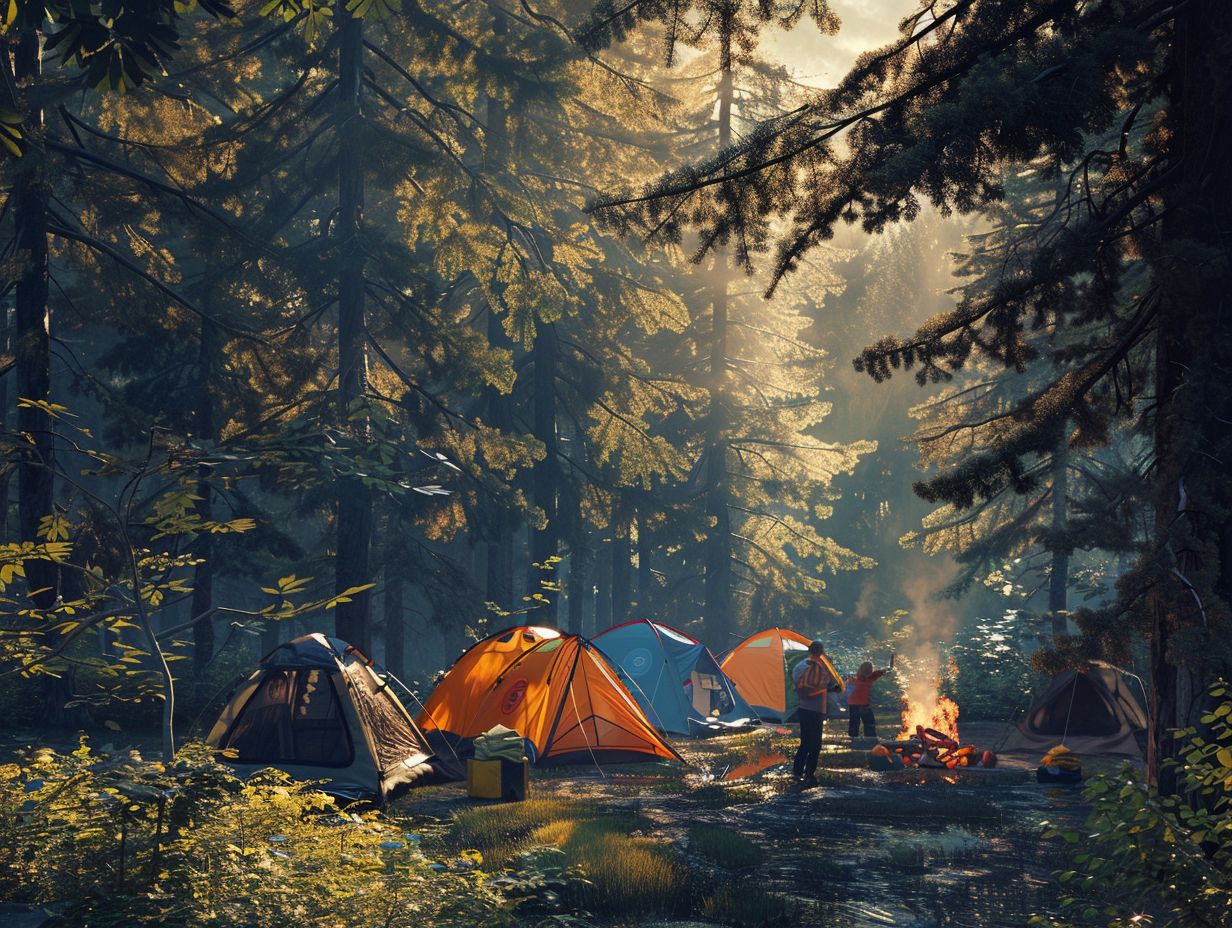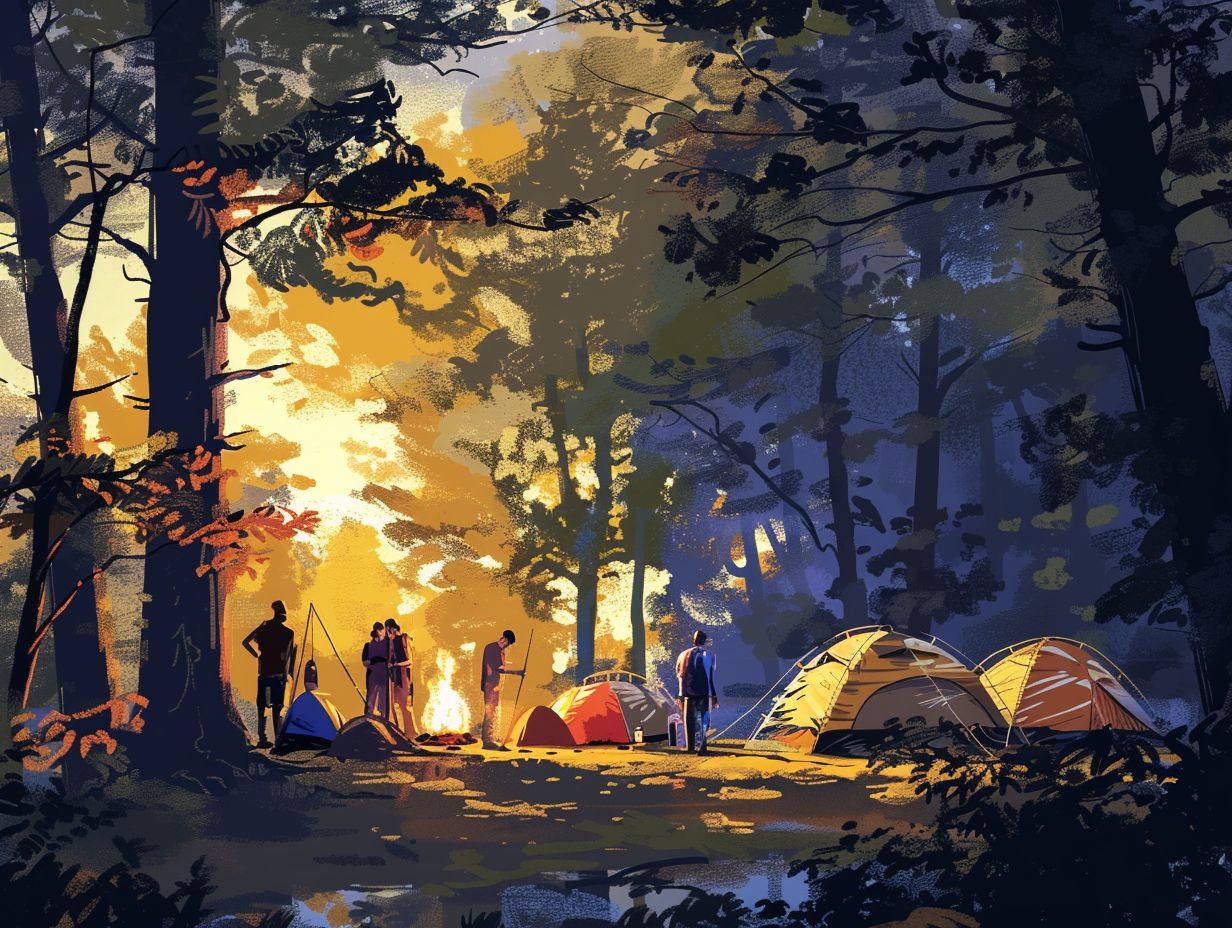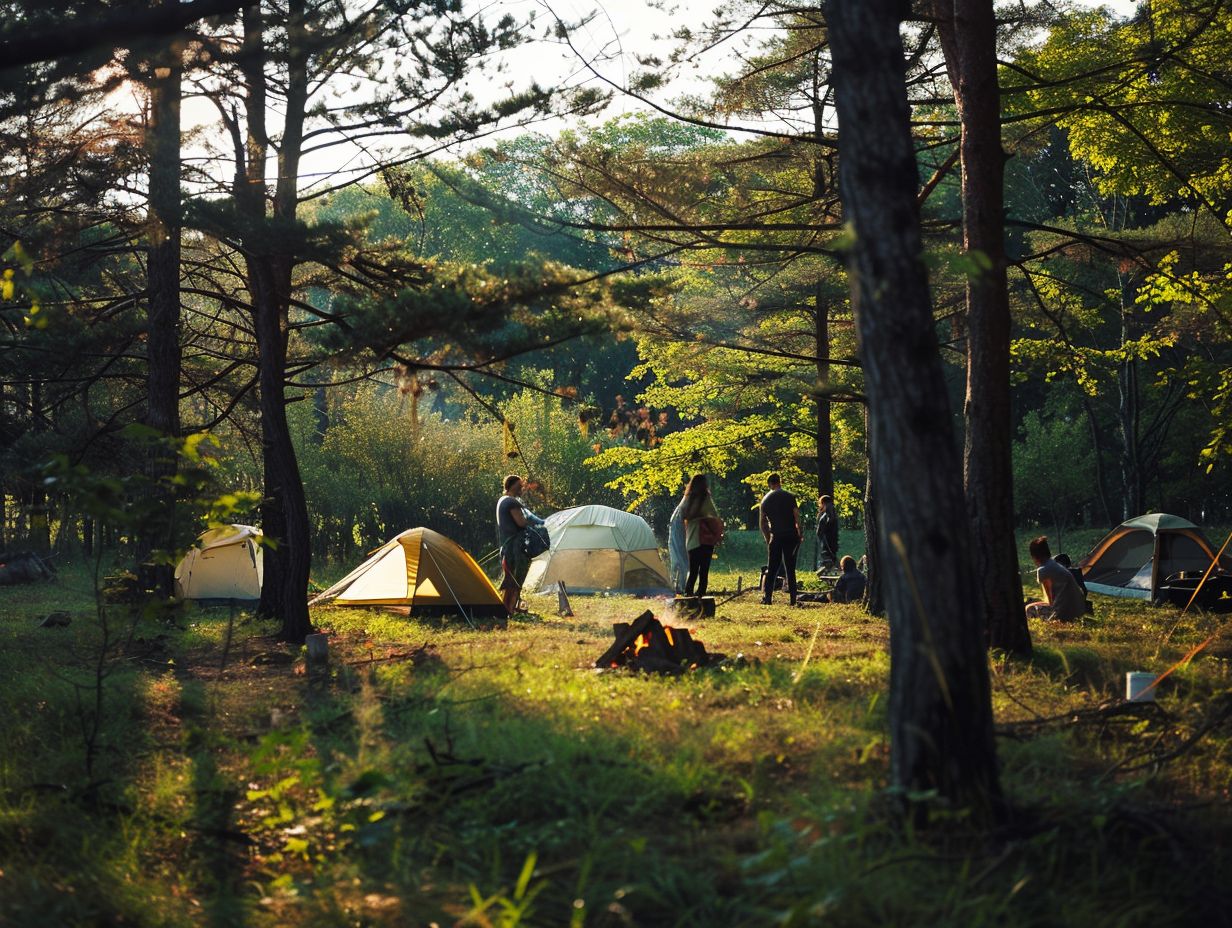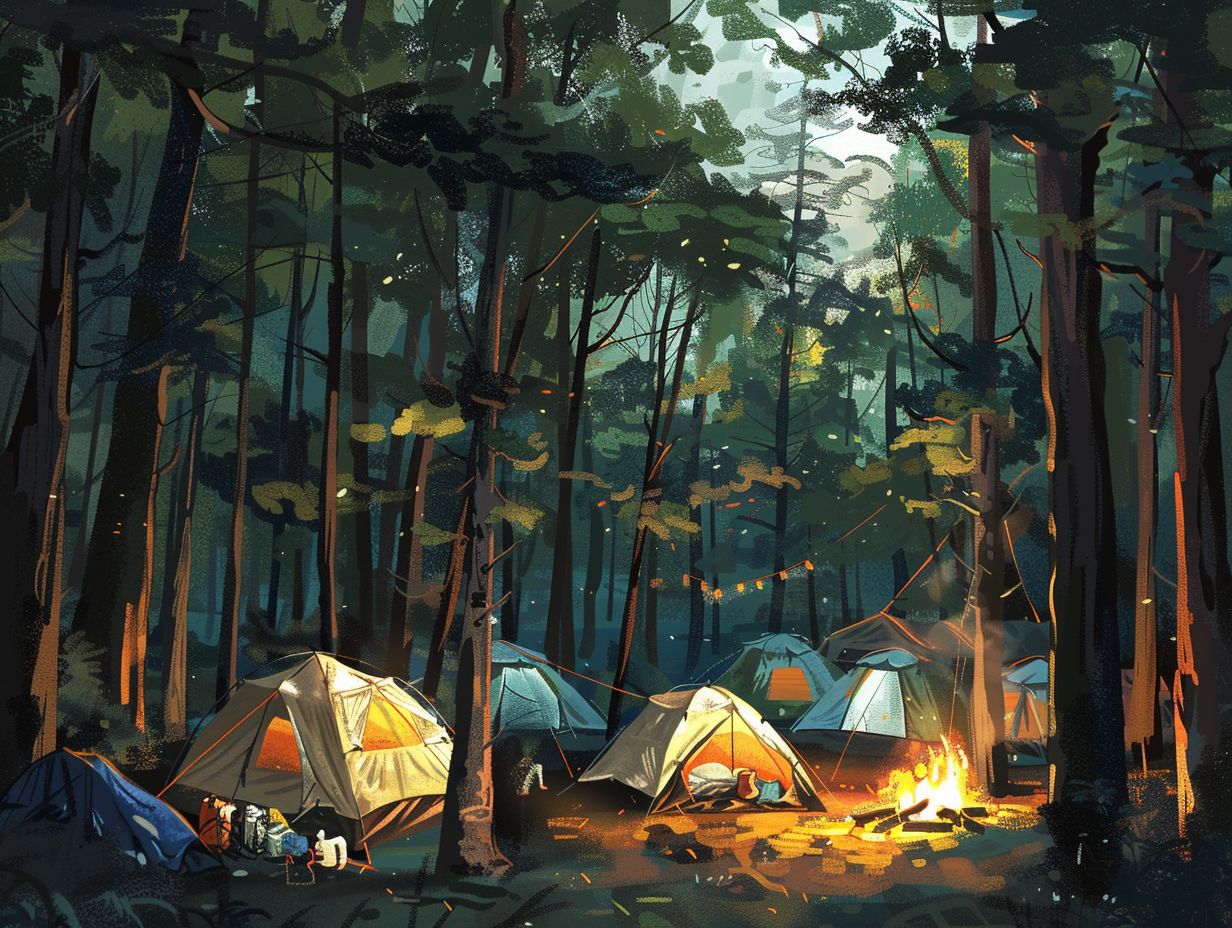If you are looking to make a positive impact while enjoying the great outdoors, there are various types of volunteer opportunities available for individuals who want to combine camping with giving back.
Explore the benefits of volunteering while camping and get advice for a successful volunteer trip to enhance your experience. Join us as we delve into the world of volunteer camping and the meaningful impact it can have on both communities and individuals.
Key Takeaways:

- Volunteer while camping to make a positive impact on local communities and the environment.
- Gain personal growth and reflection while volunteering and enjoying outdoor adventures.
- Find volunteer opportunities that align with your interests and bring a sense of purpose to your camping trips.
1. Types of Volunteer Opportunities Available
There are various types of volunteer opportunities available to you, spanning from skilled trades like carpentry, plumbing, and electrical work to roles for unskilled workers supporting organisations such as Habitat for Humanity International.
In construction projects, volunteer roles often require individuals with expertise in trades like carpentry, plumbing, and electrical work. These volunteers may be involved in constructing homes, renovating community centres, or refurbishing shelters.
Administrative support roles typically demand volunteers with skills in organisation, communication, and computer proficiency to assist with tasks like data entry, filing, and handling phone enquiries.
Community outreach initiatives seek volunteers who possess strong interpersonal skills and a passion for engaging with the public to promote events, recruit new volunteers, and advocate for important causes.
2. Benefits of Volunteering While Camping
When you volunteer whilst camping, you have the opportunity to give back to the community, support meaningful causes through fundraising efforts, and experience personal growth by engaging in outdoor programmes.
Active participation in volunteering activities at the campsite allows individuals to cultivate a strong sense of community as they collaborate towards shared objectives. This collective spirit not only enriches the overall camping experience but also fosters enduring connections with fellow campers.
Volunteering nurtures a sense of social responsibility, motivating campers to make positive contributions to the environment and local communities they explore. Through these acts of service, campers can develop vital life skills like leadership, teamwork, and problem-solving, which can prove beneficial both during and after their camping adventure.
3. Finding Volunteer Opportunities
To find volunteer opportunities, you can explore organisations like Habitat for Humanity International, RV Care-A-Vanners programme, and community blogs highlighting volunteer projects suitable for RV enthusiasts.
For more volunteer options, consider utilising online platforms such as VolunteerMatch or Idealist.org. These websites offer extensive databases of volunteer opportunities across various causes and regions, enabling individuals to discover roles that match their interests and availability.
Contacting local volunteer organisations directly or leveraging community networks can also lead to valuable connections for hands-on volunteering experiences. Engaging with social media groups dedicated to volunteerism or attending local events focused on community service can provide insight into upcoming projects and initiatives in need of committed volunteers.
4. Preparing for a Volunteer Camping Trip
Preparing for a volunteer camping trip involves ensuring you have the necessary camping gear, caravan equipment, and information on the location provided by Habitat advocates or resources like BLMNational YouTube for public lands.
It is crucial for you to pack lightweight and durable camping essentials such as a tent, sleeping bag, cooking supplies, and appropriate clothing for varying weather conditions.
Understanding the specific requirements of the volunteer project is essential; make sure to bring any tools or materials requested for the tasks. Familiarise yourself with the campsite or project location by studying maps, trails, and regulations beforehand. Safety should be a top priority, so carry a first aid kit, emergency contacts, and communication devices.
Stay efficient by organising your gear in labelled containers and planning meals in advance to minimise waste and hassle.
5. What to Bring on a Volunteer Camping Trip

When preparing for a volunteer camping trip, it is essential to pack necessary items such as camping gear, construction tools, and outdoor equipment provided by organizations such as Habitat for Humanity International.
Plus these essentials, you will need to bring suitable clothing like sturdy hiking boots, waterproof jackets, and thermal layers to ensure your comfort in varying weather conditions. Personal items including toiletries, a first aid kit, and a reusable water bottle are crucial for maintaining personal hygiene and overall well-being.
To guarantee a comfortable outdoor stay, camping supplies like a durable tent, sleeping bag, camping stove, and cooking utensils should be included in your packing list. Depending on the nature of the volunteer work, specific tools like hammers, saws, shovels, and gloves may be required for various construction or renovation tasks.
6. Tips for a Successful Volunteer Camping Trip
For a successful volunteer camping trip, it is crucial to collaborate with your fellow volunteers, seek support from experienced campers, and consider professional assistance for complex tasks during the volunteering programme.
Building strong teamwork among volunteers can significantly enhance the camping experience by fostering a sense of community and shared responsibility. Open communication and task delegation based on individual strengths can effectively streamline the volunteer efforts.
Seeking guidance from seasoned volunteers can offer valuable insights into managing challenges such as setting up camp, resource management, and handling unexpected situations.
Utilising professional services, such as wilderness guides or outdoor educators, for specialised tasks like first aid or navigation, can ensure safety and the efficient completion of activities.
7. Best Places to Volunteer While Camping
Some of the best places for you to volunteer whilst camping include public lands managed by BLM, eco-friendly initiatives at Girl Guide camps, and opportunities tailored for RV-ers like yourself seeking meaningful volunteer experiences. These locations offer you an excellent opportunity to combine your love for camping with giving back to the environment.
National parks such as Yosemite and Yellowstone have a variety of volunteer programmes, ranging from trail maintenance to wildlife monitoring, enabling you to actively engage in conservation efforts.
Community-based projects in coastal areas or mountain regions also extend a warm welcome to volunteers like you to help with activities such as beach clean-ups, tree planting, or habitat restoration.
Participating in such volunteer work not only cultivates a sense of community and stewardship but also enables you to form a deeper connection with the natural world.
8. Combining Adventure and Giving Back
Combining adventure with giving back allows you to explore new destinations, connect with local communities, and leave a lasting impact through contributions to legacy funds supporting future projects. Engaging in volunteer efforts whilst on an adventure trip not only provides you with a unique perspective on the destination but also creates meaningful interactions with the local residents.
These connections can lead to a deeper understanding of the culture and environment, fostering a sense of empathy and global citizenship. The long-term effects of volunteerism in these communities extend beyond immediate help, often resulting in improved infrastructure, education, and sustainability practices. By integrating volunteer work into your travel experiences, you can make a profound difference that resonates far beyond your trip.
9. Impact of Volunteer Camping Trips on Local Communities
Volunteer camping trips can have a significant impact on local communities by providing support for essential building projects, promoting community engagement, and advancing sustainable development in partnership with organisations such as Habitat for Humanity International.
These trips play a crucial role in not only facilitating infrastructure improvements, such as constructing homes, schools, and community centres but also in enhancing social cohesion within the community. Through collaborative experiences and teamwork, volunteers and community members forge meaningful connections that endure beyond the project’s timeframe.
These volunteer initiatives often lead to capacity development, equipping local community members with new skills and knowledge to sustain positive changes long after the volunteers’ departure.
10. How to Make the Most of Your Volunteer Experience

To maximise your volunteer experience, it is important to actively engage with the programme, enhance your skills through hands-on work with Habitat projects, and contribute to fundraising and marketing efforts that sustain volunteer initiatives.
Collaborating with fellow volunteers not only fosters a sense of community but also presents networking opportunities that may prove valuable for future endeavours. Assuming leadership roles within the program can help boost your confidence, refine your decision-making abilities, and offer a platform to demonstrate your capabilities.
Utilising your existing skills for the benefit of the program is instrumental in achieving project objectives and facilitating personal growth and development. Engaging in continuous learning through workshops, feedback sessions, and self-reflection is essential for maximising the impact of your volunteer experiences.
11. Volunteering as a Family or Group
Volunteering as a family or group offers you a rewarding experience where members can bond over shared projects, leverage diverse skills such as those of skilled contractors, electricians, and painters, and make a collective impact on communities in need.
When you leverage the varied skill sets within your group, you can achieve more efficient task completion. For example, a graphic designer may create promotional materials for a charity event, while a teacher can organise educational workshops.
This form of skill-sharing not only benefits the community but also enhances the personal growth and development of individuals involved. Working together towards a common goal can strengthen relationships by fostering effective communication, problem-solving, and teamwork among members.
12. Choosing the Right Volunteer Organisation
When selecting a voluntary organisation, you should carefully consider various factors such as the alignment of their mission with organisations like Habitat for Humanity International, your need for professional opportunities, and the potential for office managers or business administration executives to contribute their expertise.
It is essential to thoroughly examine the values upheld by the voluntary organisation to ensure they align with your personal beliefs. Assess whether your skills and expertise match the projects and initiatives the organisation focuses on.
Conducting research on the organisation’s reputation and track record can provide valuable insights into their impact and credibility in the community. Evaluating the support structure offered by the organisation can give you an understanding of the resources and guidance available for volunteers.
By taking these considerations into account, you can identify a voluntary organisation that aligns with your values, skills, and objectives.
13. Volunteering with a Specific Cause in Mind
When you volunteer with a specific cause in mind, such as joining programmes like RV Care-A-Vanners, working with Habitat advocates, or utilising specialised skills like tilers, you can make targeted contributions aligned with your passions and expertise.
Aligning your volunteer efforts with your personal interests and values allows you to find fulfilment and make a meaningful impact in areas that resonate with you. Whether you engage in conservation projects to protect the environment, support educational initiatives to enable young people, or participate in disaster relief efforts to help communities in need, there are countless opportunities for you to actively contribute to causes that are dear to your heart.
14. How to Continue the Impact After Your Volunteer Camping Trip
To continue the impact after your volunteer camping trip, you should consider supporting initiatives like the Legacy Fund or engaging with partners such as the Winnebago Industries Foundation to maintain the progress achieved during the volunteer programme.
By staying connected with the cause you supported during your trip, you can continue to make a difference in the lives of those in need. Participating in post-trip fundraising events, organizing advocacy campaigns, or committing to ongoing volunteer opportunities are effective ways for you to stay engaged.
Sustained involvement in community projects not only benefits the recipients but also enhances your personal growth, provides a sense of fulfillment, and strengthens your network within the volunteering community.
15. Personal Growth and Reflection Through Volunteer Camping

Engaging in volunteer camping activities can foster personal growth by enabling you to develop skills, engage in self-reflection, and partake in transformative outdoor experiences that contribute to your holistic development. These unique opportunities offer you a chance to step out of your comfort zone, helping you build resilience and adaptability as you navigate unfamiliar terrain and environments.
By participating in conservation projects or community initiatives, you can learn valuable teamwork and leadership skills, improving your ability to collaborate and communicate effectively.
The immersive nature of volunteer camping can help you form a deeper connection with nature, fostering empathy and environmental stewardship. This hands-on approach not only benefits the community and nature but also aids you in gaining a deeper understanding of yourself and your role in the world.
Frequently Asked Questions
What is Camping with a Cause?
Camping with a Cause is a non-profit organization that combines outdoor camping experiences with volunteer opportunities. We believe in giving back to our community and making a positive impact in the world.
What kinds of volunteer opportunities are available through Camping with a Cause?
There are a variety of volunteer opportunities available through Camping with a Cause, including environmental conservation, community service, and disaster relief efforts. We partner with different organizations to offer a diverse range of volunteer experiences.
Do I need prior camping or volunteer experience to participate?
No, prior experience is not necessary. Our volunteer opportunities are open to individuals of all skill levels and backgrounds. We provide training and support to ensure a successful and meaningful experience.
How can I get involved with Camping with a Cause?
You can get involved with Camping with a Cause by signing up for one of our volunteer opportunities or by donating to support our cause. You can also follow us on social media and help spread the word about our organization.
What are the benefits of volunteering with Camping with a Cause?
Volunteering with Camping with a Cause allows you to make a positive impact in the world while also enjoying the great outdoors. It’s a unique and fulfilling way to give back to the community and connect with like-minded individuals.
Is there a minimum age requirement for volunteering with Camping with a Cause?
The minimum age requirement varies for each of our volunteer opportunities. Some may be suitable for children, while others may require participants to be at least 18 years old. Please check the specific volunteer opportunity for age restrictions.



